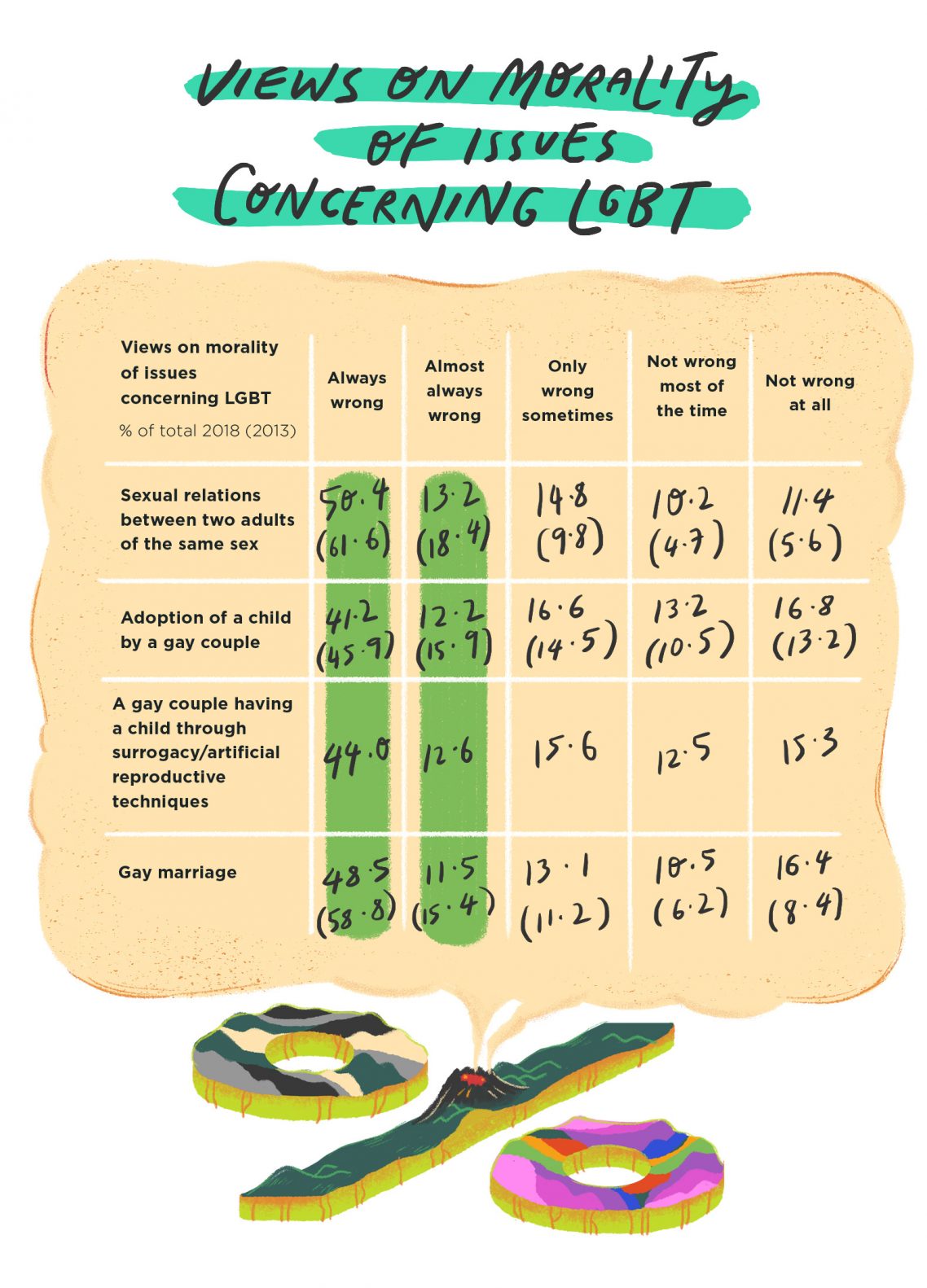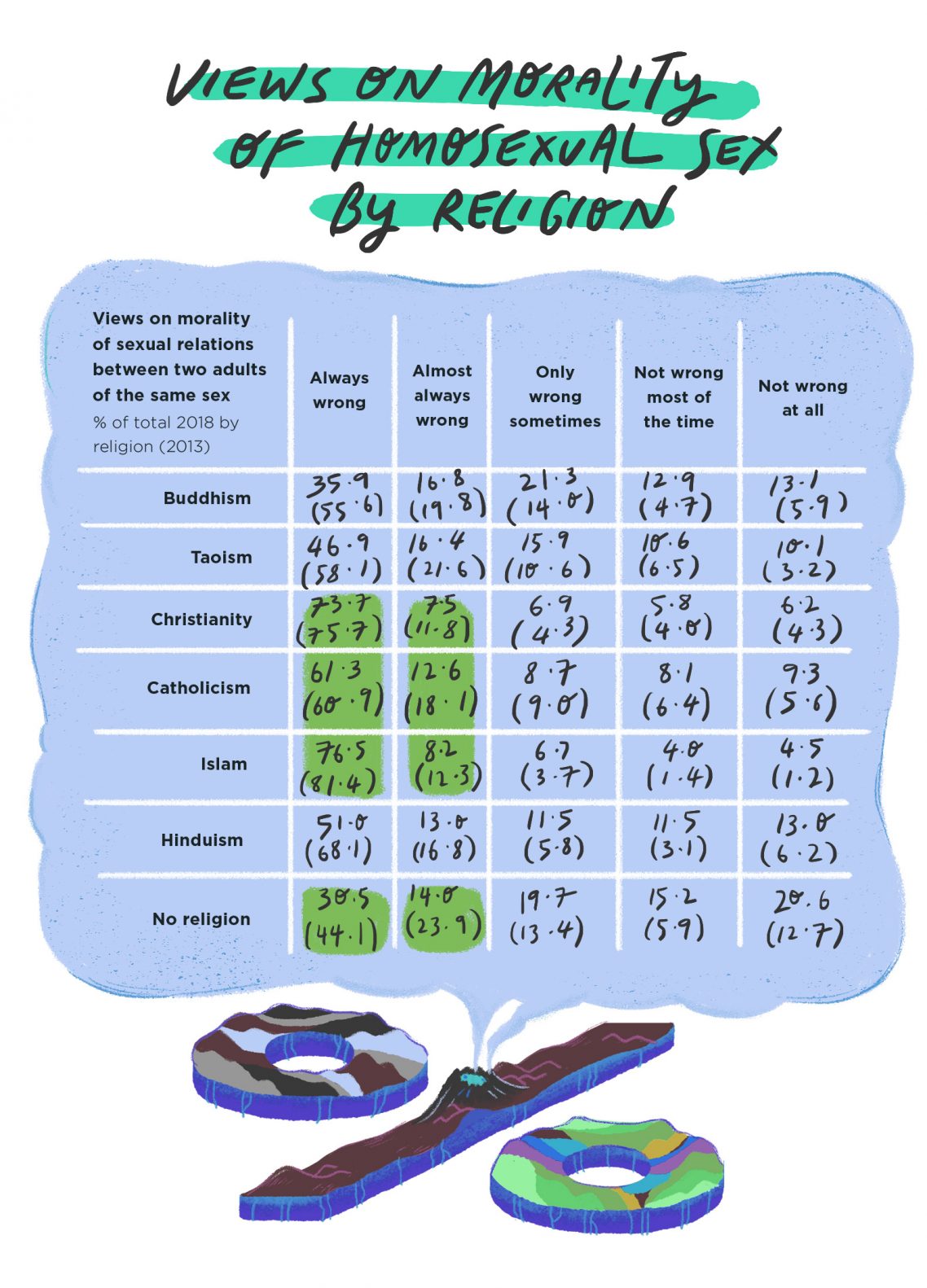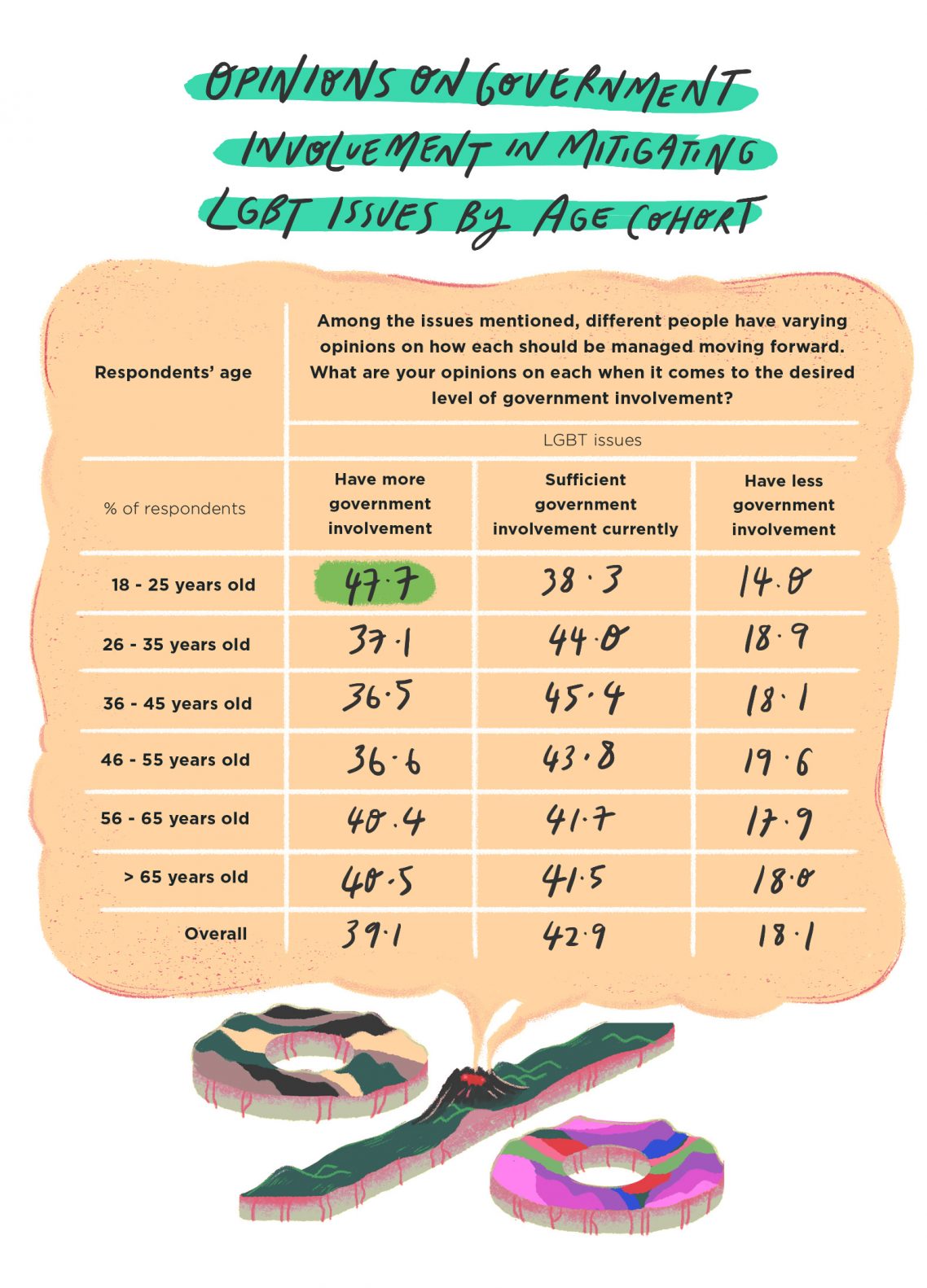If trends continue, the picture is clear: We, as believers in Jesus Christ, will increasingly live in a culture whose values and beliefs are at odds with those we hold.
The Institute of Policy Studies (IPS) recently published a paper that highlighted local views across five fault lines in Singapore, with lesbian, gay, bisexual, transgender (LGBT) issues being one of them. The insights were based on the responses of over 4,000 people who participated in the 2018 IPS Race, Religion and Language study.
(This is the second article in a two-part series reflecting on the findings. The first focused on the fault line of religion and the implications that it has for evangelism in Singapore.)
INCREASINGLY LIBERAL ATTITUDES ON LGBT ISSUES
Based on the statistics gathered by IPS, those who thought that gay marriage was “always wrong” or “almost always wrong” added up to 74.2% in 2013, but fell to 60% in 2018.

Similar declines within the five-year window were found for views on “adoption of a child by a gay couple” (from 61.8% to 53.4%) or “sexual relations between two adults of the same sex” (from 80% to 63.6%).
These observations echo the findings in another recent IPS study, which “found steep drops in opposition towards homosexual sex and associated issues on LGBT across the past half-decade” among those surveyed.
CHRISTIANS, CATHOLICS AND MUSLIMS MORE LIKELY TO HOLD CONSERVATIVE VIEWS
The researchers noted that the trend of increasingly liberal attitudes towards LGBT was clear among those who were younger and those with higher educational qualifications, as well as those of non-monotheistic faiths (a monotheistic faith is one which believes there is only one God) or who profess no religion.

But they warned that this fault line could deepen “because views on LGBT issues are often fervently held, with substantial portions of the population indicating ‘views at the poles’ (either expressing that gay marriage is always wrong or not wrong at all), and because the differences in views by age cohorts, education levels and religions (or lack thereof) are substantial”.
MANY ARE UNCOMFORTABLE ABOUT RELIGIOUS LEADERS ADDRESSING THIS ISSUE IN PUBLIC
The study also found that majority of the respondents (61.5%) would feel uncomfortable if religious leaders or people spoke up strongly in public about LGBT issues, while a substantial portion (38.5%) indicated no issues with religious leaders or people doing so.

“However, this division in opinions varied across different religious groups,” the researchers noted.
The majority of Buddhist, Taoist, Muslim respondents as well as respondents with no religion (7 in 10) felt uncomfortable with religious leaders speaking out strongly on LGBT issues publicly, compared to about 5 in 10 among Christians.
A “SUBSTANTIAL PROPORTION” WANT THE GOVERNMENT TO BE MORE INVOLVED
Younger respondents were more likely to desire greater state involvement (47.7% of 18- to 25-year-old respondents) than those in older age groups. Even across the various age groups, the study authors noted “a substantial proportion of respondents” in favour of greater government involvement in dealing with LGBT issues.

Further analysis revealed that 55.3% of 18- to 35-year-old respondents who identified with liberal sexual values desired greater state involvement, as compared to only 40.9% of their counterparts who identified with conservative sexual values.
“This illustrates that youth identifying with liberal sexual values were the most likely to desire greater state involvement in LGBT issues – probably in terms of repealing 377A and ensuring equal rights,” said the researchers.
Questions whether, how and to what extent the government should step in on various issues are important to discuss. However, regardless of the state of politics or the prevailing cultural winds, the call of believers remains the same in every season: to testify to the Gospel.
Here are a few fundamental truths that the Church can bear in mind.
HOW DOES GOD WANT US TO VIEW GENDER AND SEXUALITY ISSUES?
Firstly, we should understand God’s design for human identity and sexuality. God created male and female in His image (Genesis 1:27), and marriage is a lifelong and exclusive union between a man and a woman, oriented towards producing new life. It’s an essential part of the Gospel testimony, reflecting the union of Christ and His beloved Church (Ephesians 5:22-33).
Our identity, meaning and purpose in life are not derived from our sexual desires or preferences, but from being made in God’s image and being called children of God through Jesus Christ.
Secondly, we need to exercise compassion without compromise. We shouldn’t misuse the Bible to justify violence or ill-treatment of anyone. We also shouldn’t bend the Word of God to justify behaviours and lifestyles that are contrary to God’s design.
In June, I went to the Jerusalem March for Pride and Tolerance. I was there neither to participate in the march or the counter-protest, but to pray. One side was calling for greater acceptance of LGBT, while the other was calling for Biblical standards on sexuality to be maintained.
As I watched and prayed, I felt that most people on either side were motivated by goodwill, at least from their point of view, and there is a human side to many of the cultural, ideological or political debates that we see today.
People whose values, beliefs and lifestyles differ from us are not our enemies. All human beings (including ourselves) are sinners in need of grace. Indeed, the Bible tells us that “we were God’s enemies”, until God reconciled us through Jesus Christ (Romans 5:10).
Thirdly, we are, and will always be, aliens and strangers in the world (1 Peter 2:11). And we must at all times be prepared to give the reason for our hope, with “gentleness and respect” (1 Peter 3:15).
But in case we are tempted to panic or despair, we should also remember that we as a Body of Christ have been in this position before.
In the early church, the apostles and believers lived in a culture whose values, beliefs and sexual practices fundamentally differed from their own. In fact, within the Corinthian church were those who used to identify with this way of life (1 Corinthians 6:9-11).
Likewise, there are many within our congregations today who have similar testimonies about God’s saving grace – and there may be many more whom God intends to touch and transform in the days to come.
Darius Lee spent a year and two months in Israel, completing a Master’s in International Law and Human Rights at the Hebrew University of Jerusalem. He firmly believes that God has called us to act justly, love mercy and walk humbly with Him (Micah 6:8). He has written about his journey of discipleship in his book, Like a Fire in My Bones: A Journey of Discipleship.









